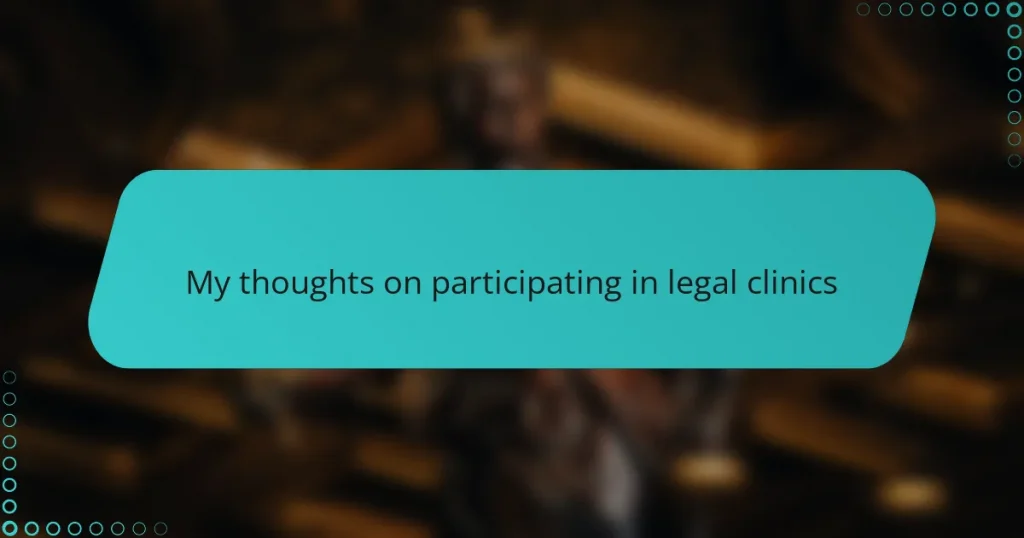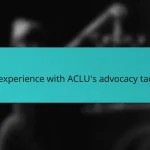Key takeaways
- Legal advocacy is rooted in empathy, understanding clients’ struggles, and providing support in a complex legal system.
- Participating in legal clinics offers hands-on experience, building practical skills and confidence while making a direct impact on clients’ lives.
- Effective communication and problem-solving under pressure are vital skills developed through real client interactions in legal clinics.
- Future participants should embrace listening, navigate uncertainty, and practice self-care to maintain their emotional wellbeing while advocating for clients.
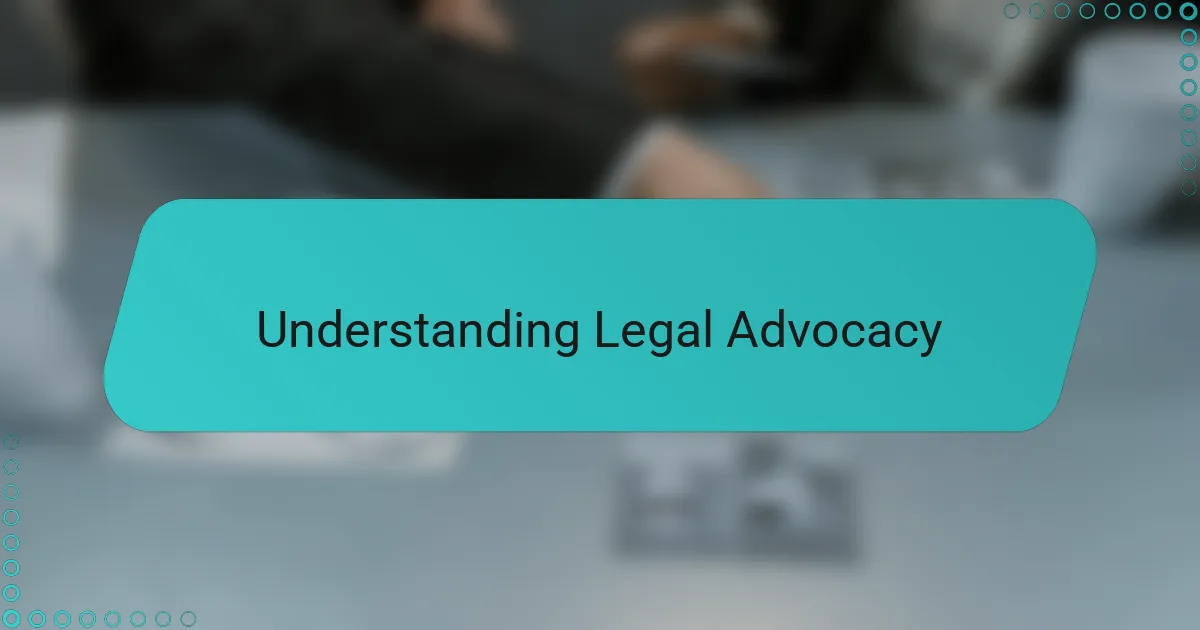
Understanding Legal Advocacy
Legal advocacy, to me, is more than just representing clients; it’s about being their voice when they feel unheard. Have you ever witnessed someone struggle to navigate the complex legal system alone? That’s where advocacy steps in—it’s the bridge between confusion and clarity.
I remember the first time I truly understood the power of legal advocacy. It wasn’t in a courtroom, but while listening to a client’s story, feeling their frustration and hope all at once. This experience showed me that advocacy isn’t just about laws; it’s about empathy and determination.
Isn’t it remarkable how legal advocacy combines knowledge, passion, and a genuine desire to make a difference? It pushes us to challenge injustices and supports people during some of their most vulnerable moments. Understanding this makes participating in legal clinics feel like an essential step toward meaningful change.
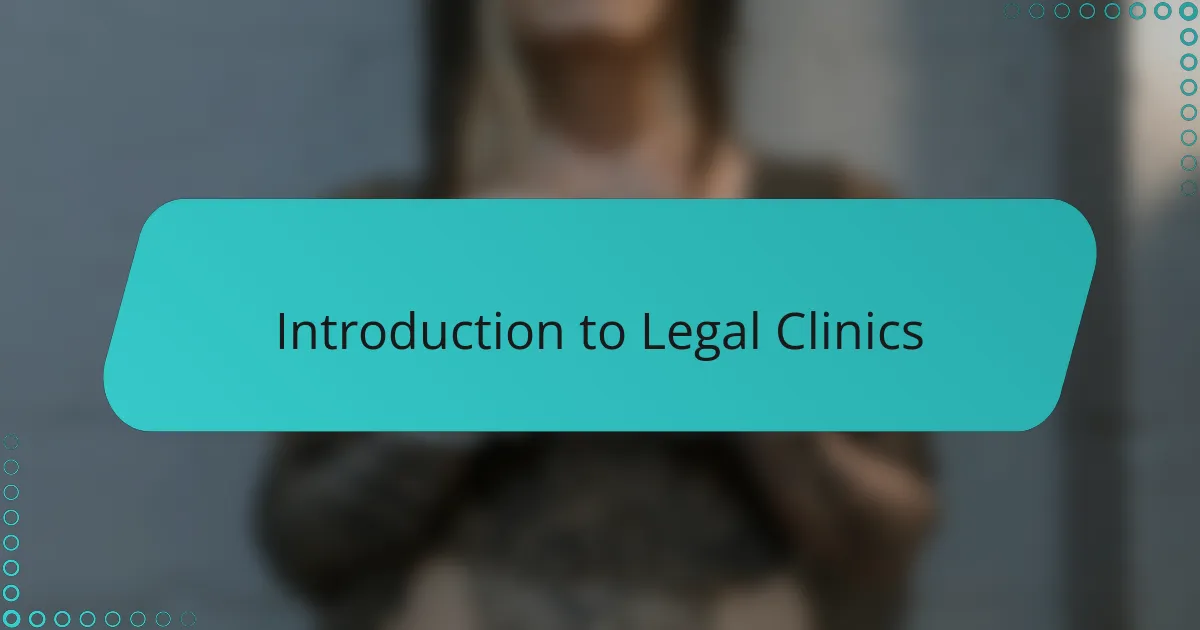
Introduction to Legal Clinics
Legal clinics, as I see them, are much more than just learning environments; they are spaces where theory meets real life. Have you ever wondered what it’s like to step beyond textbooks and actually help someone untangle their legal problems? That hands-on experience is what legal clinics offer, and it’s something I found both challenging and rewarding.
When I first walked into a legal clinic, I felt a mix of excitement and nerves. The opportunity to listen directly to clients, many of whom faced overwhelming situations, opened my eyes to the true impact of accessible legal help. It made me realize that these clinics are not just about gaining skills—they’re about making an immediate difference in people’s lives.
What struck me most was the sense of community within the clinic—students, supervisors, and clients all coming together with a common goal. It’s a collaborative space where learning happens alongside empathy and advocacy, shaping not only competent legal professionals but also compassionate ones. Wouldn’t you agree that this blend is essential for anyone serious about legal advocacy?
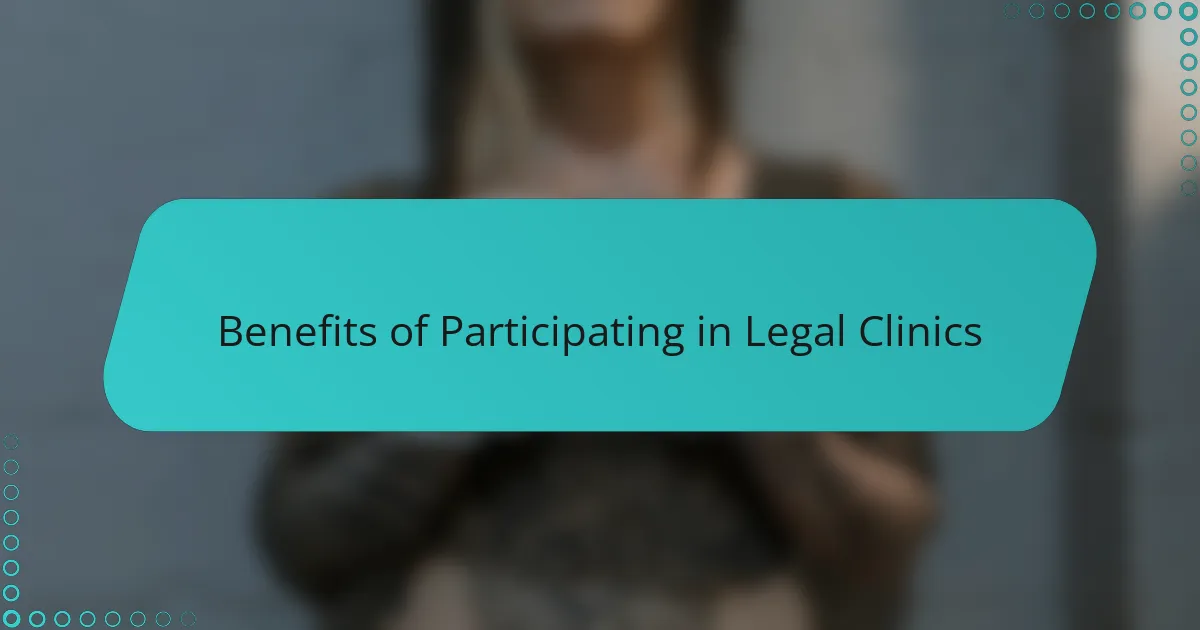
Benefits of Participating in Legal Clinics
One of the biggest benefits I’ve experienced in legal clinics is the chance to build real confidence. There’s nothing quite like preparing your own cases and seeing how your advice actually helps someone. Have you ever felt that mix of pride and responsibility when your words truly matter? That’s what participating in clinics taught me—how to trust my judgment while still learning from mentors.
Another aspect I admire is how legal clinics ground you in practical skills often missing from textbooks. Drafting documents, conducting client interviews, and negotiating solutions—all these tasks helped me see the law in action. It’s one thing to understand legal principles, but applying them to real people’s problems changed how I view advocacy. Do you think theory alone prepares anyone for the realities of legal work? In my experience, clinics fill that critical gap.
Finally, I cherish the human connections that happen in these settings. Listening to clients’ stories, sharing their frustrations and hopes, reminded me why I chose this path. It’s humbling to realize how much someone depends on your guidance during their toughest moments. Doesn’t that make the effort feel worthwhile? For me, legal clinics transformed abstract ideals into compassionate action.
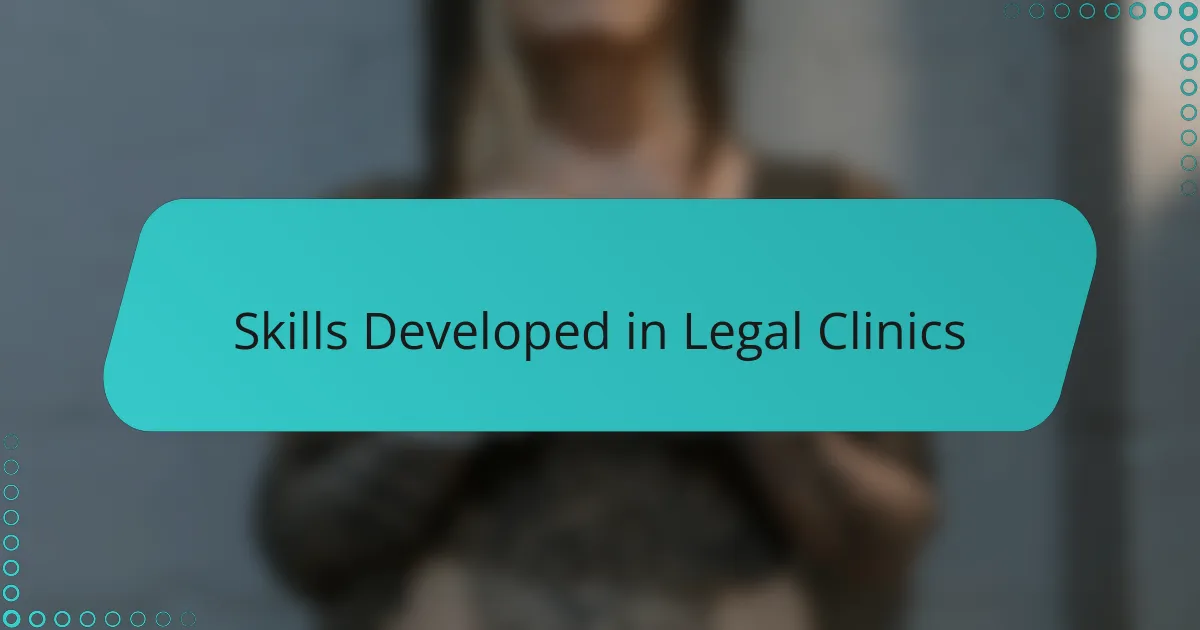
Skills Developed in Legal Clinics
One skill that legal clinics helped me develop deeply is effective communication. Sitting face-to-face with clients taught me how to listen beyond words and ask questions that reveal critical details. Have you noticed how real conversations often demand more patience and clarity than classroom discussions? That’s exactly what legal clinics simulate.
Another crucial ability I gained was problem-solving under pressure. There’s something about managing a client’s urgent needs while balancing legal constraints that sharpens your thinking. I remember rushing to draft a crucial document before a deadline—it was stressful but incredibly rewarding to see how my work made a difference in time.
Perhaps most importantly, legal clinics fostered my sense of professionalism and ethical awareness. Handling sensitive information and respecting diverse backgrounds isn’t just protocol; it’s a responsibility that shapes who we become as advocates. Don’t you think that these experiences prepare us far better than any lecture could? For me, they form the foundation of trustworthy, empathetic legal practice.
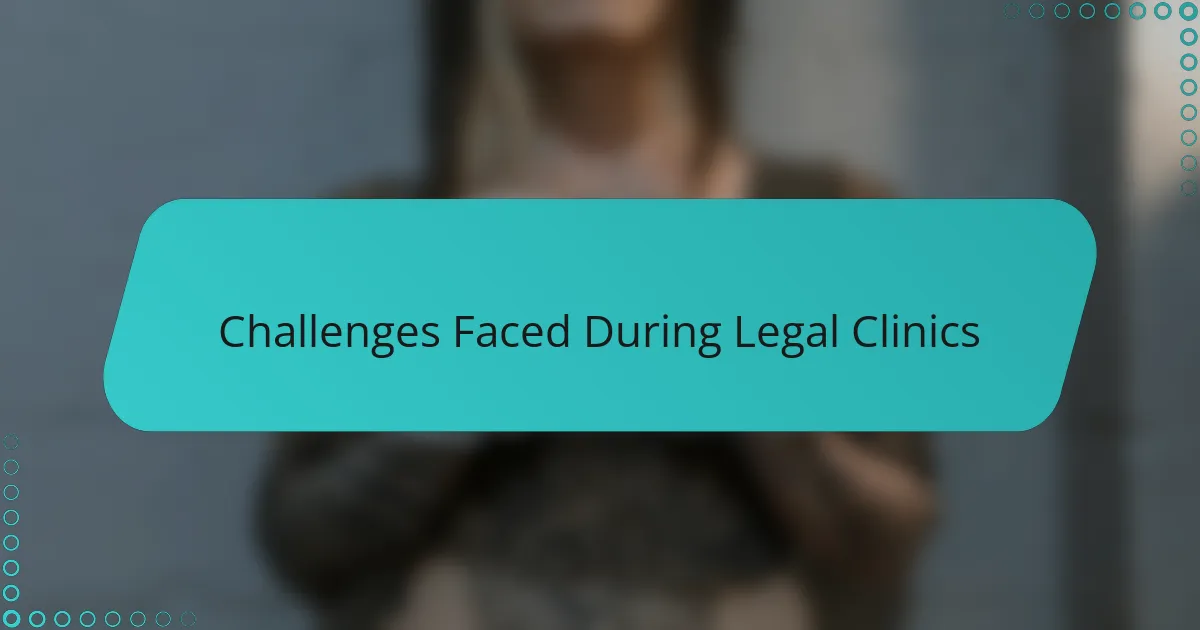
Challenges Faced During Legal Clinics
One challenge I often faced in legal clinics was managing the sheer emotional weight of client stories. It’s hard not to feel overwhelmed when you hear firsthand about struggles that seem so vast and complex. Have you ever found yourself torn between empathy and the need to stay professionally focused? I certainly did, and it took time to find that balance.
Another difficulty came from navigating tight schedules and limited resources. Legal clinics often operate under time constraints, yet every client deserves thorough attention. I remember rushing to prepare documents while trying not to let the pressure affect the quality of my advice. Doesn’t that tension highlight how essential good time management and support systems are in these settings?
Lastly, I struggled with the unpredictability of each case. No two clients are alike, and legal issues can shift unexpectedly as new information emerges. This uncertainty pushed me to stay adaptable and think on my feet, but I won’t pretend it was easy. Can you imagine having to quickly adjust your strategy while knowing someone’s trust is in your hands? For me, that challenge underscored the real-world intensity of legal advocacy.
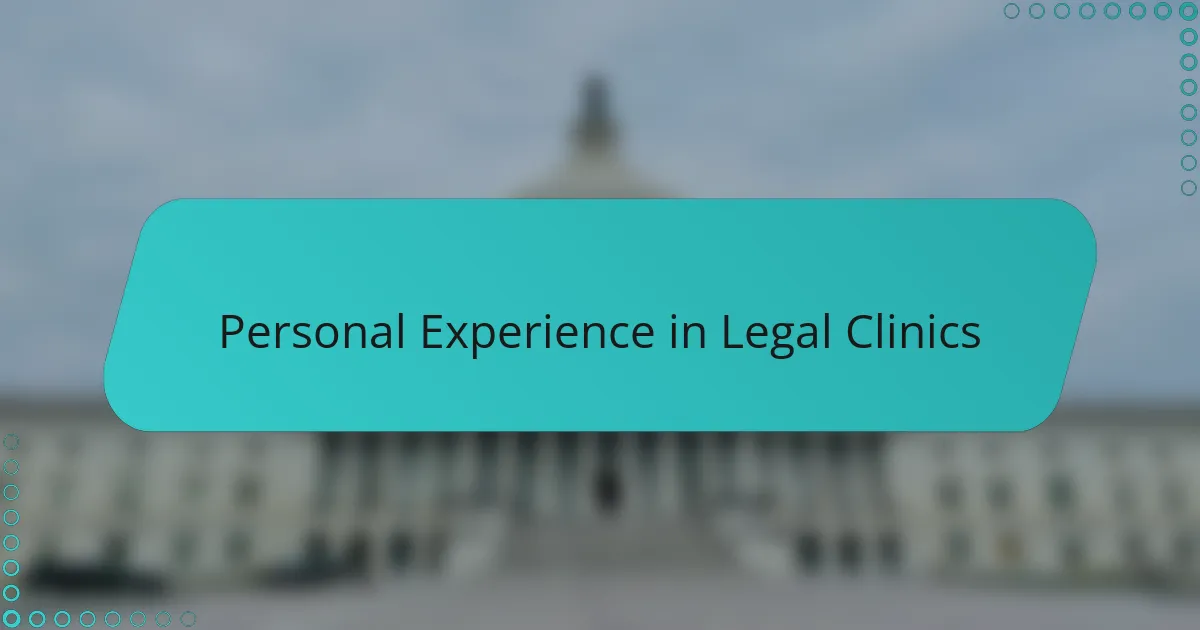
Personal Experience in Legal Clinics
Participating in legal clinics was a turning point for me, revealing the gap between academic knowledge and real-world impact. I still recall the first client meeting where my advice genuinely eased someone’s anxiety—that moment made all the studying worthwhile. Have you ever felt the thrill of realizing your words could change someone’s day? That’s the essence of what those experiences taught me.
I also noticed how each encounter shaped my understanding of justice beyond statutes. Hearing clients’ stories—filled with resilience and hardship—made the abstract very tangible. There were times when I left the clinic feeling emotionally drained but deeply motivated, wondering how I could do more, yet grateful for the opportunity to serve.
Sometimes, the unpredictability of cases caught me off guard. One moment, I was drafting straightforward documents, and the next, I was navigating unfamiliar legal territory under time pressure. Did I always feel ready? Certainly not. But that unpredictability pushed me to grow quickly and embrace the challenges inherent in legal advocacy.
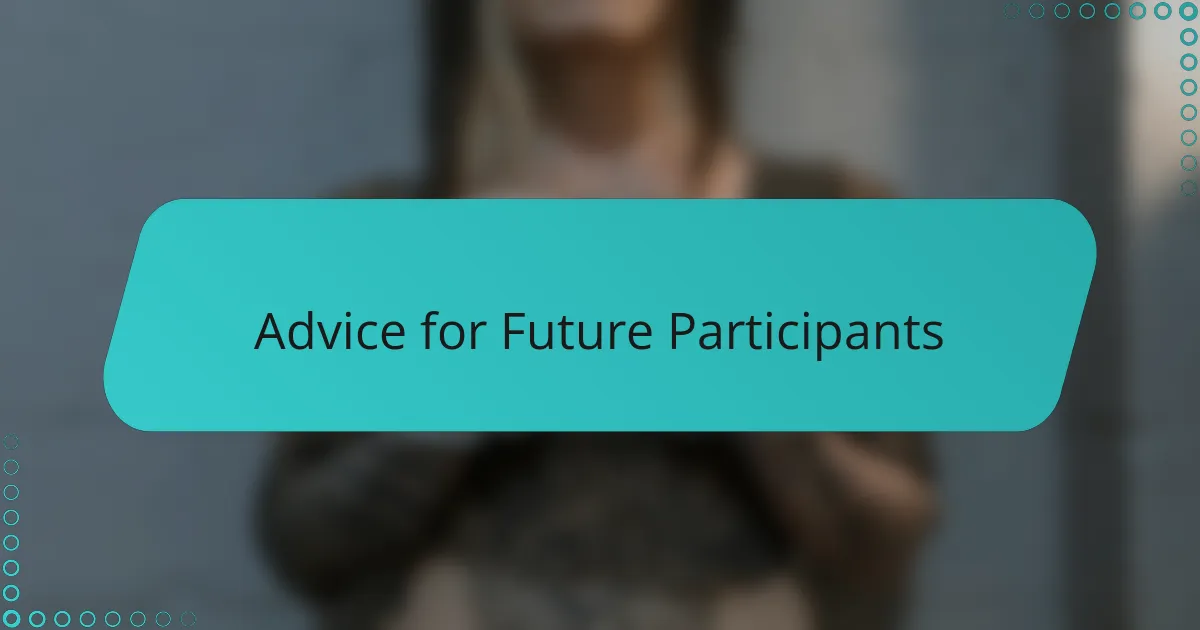
Advice for Future Participants
If I were giving advice to someone about to join a legal clinic, I’d say: come prepared to listen deeply. It’s tempting to focus only on the legal facts, but those moments when clients share their stories are where you really learn what’s at stake. Have you ever noticed how much a simple, attentive ear can mean? From my experience, that openness sets the tone for everything that follows.
Another thing I’d stress is the importance of embracing uncertainty. During my first clinic, I frequently felt unsure—no script prepared me for the twists in each case. But isn’t that unpredictability part of what makes the work real and meaningful? I found that staying flexible and asking for guidance when needed transformed those moments from intimidating to invaluable learning opportunities.
Lastly, remember to pace yourself emotionally. It’s easy to feel overwhelmed by the weight of clients’ struggles, especially early on. Have you ever wondered how to keep your empathy from tipping into burnout? I learned that taking small breaks and discussing challenges with supervisors helped me recharge and stay effective. Balancing compassion with self-care isn’t just advice—it’s essential for lasting impact in legal advocacy.
